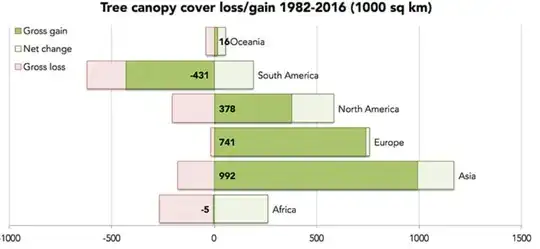There are several news reports 1, 2, 3, which are all mentioning this study, that is unfortunately not open-source.
The findings were
The research suggests an area covering 2.24 million square kilometers - roughly the combined land surface of Texas and Alaska, two sizeable US states - has been added to global tree cover since 1982.
But it is also mentioned, while the northern hemisphere has more trees, south America has lost a lot and the diversity of the trees went down.
 Image Reference
Image Reference
I know this is not a hundred years ago, but only 35 years. Given the fact that he held a speech and the claim sounds very similar (only time is offset, but on the same scale) and he retweeted a similar news story, were the claim was
“Deforestation has stopped in wealthy countries. Europe’s forest area grew by more than 0.3% annually from 1990 to 2015. In the United States it is growing by 0.1% annually.”
I am pretty certain he didn't mean exactly a hundred years ago.
